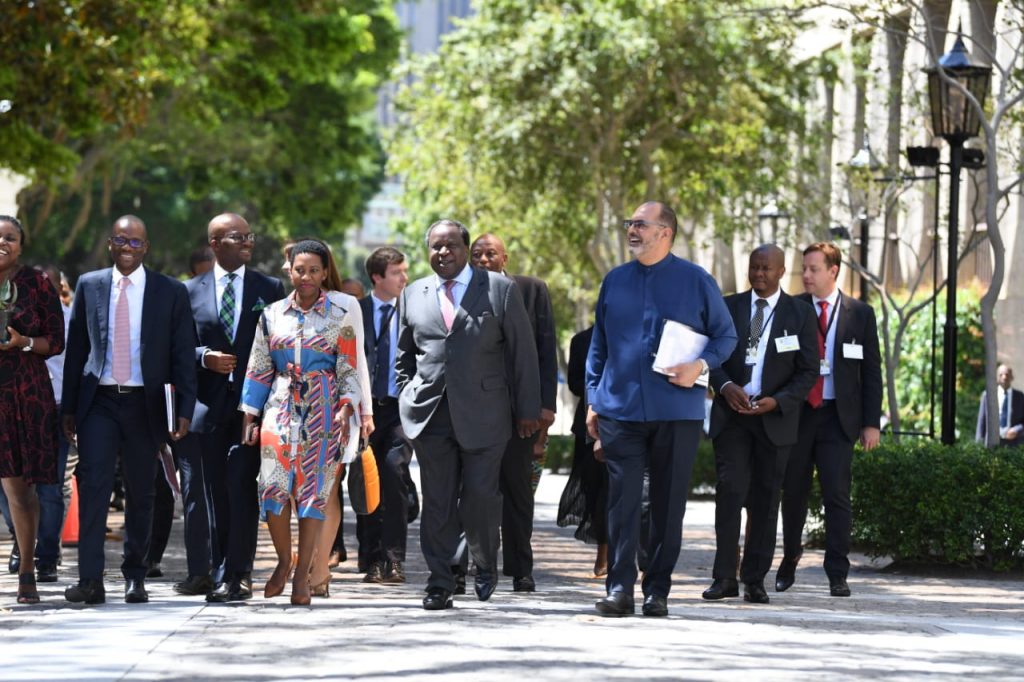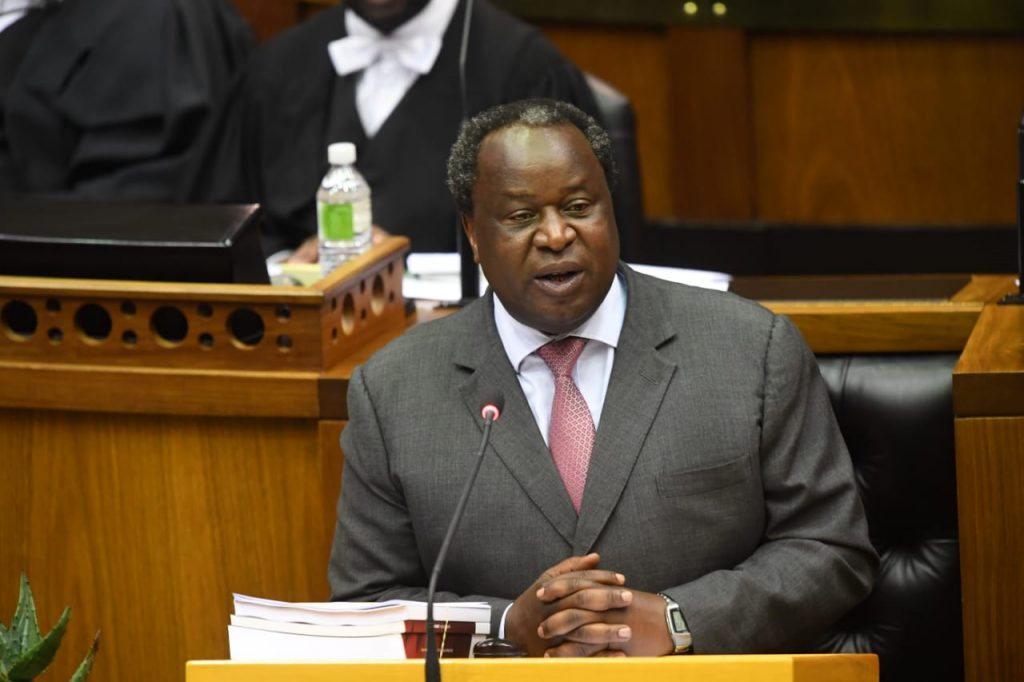Thalia Holmes
Finance Minister Tito Mboweni finished his 2020 budget speech on Wednesday by quoting anti-apartheid activist Bram Fischer’s final words from the dock in his 1966 trial:
“With confidence we lay our case before the whole world, whether we win or die, freedom will rise in Africa, like the sun from the morning clouds”.

And if anyone has been on the political dock recently, it is Mboweni.
With the South African economy growing a mere 0.7% in the past year, and expected to grow no more than 1% each year for the next three, unemployment looming near 30%, and public debt-to-GDP rising continuously to an expected 71.6% in the medium term, Mboweni faced an almost impossible task.
“The minister is in the unenviable position of balancing the…needs of an economy that’s in doldrums, Moody’s breathing down our necks, and the politics that he’s facing,” said Cas Coovadia, chairman of the Banking Association of South Africa, in the wake of the speech.
For Moody’s, the most urgent requirement was to show solid structural reform. On the political front, the usual pressures around social grants, education, health and most recently, the state bank arose.
But for the discouraged South African people, Mboweni’s most pressing responsibility was to foster hope.
And, judging from overall sentiment following the speech, he managed to deliver on this mandate.
Good news on the tax front
Because tax revenue has disappointed in 2019/20 – Mboweni said it was revised downward by R63.3 billion to R1.425 trillion in 2019/20 — it was roundly speculated that the minister would increase tax to make up for the shortfall. Instead, he announced that there would be no major tax increases.
“Indeed, there is some real personal income tax relief,” said the minister. “Someone earning R10 000 a month will pay 10% less in tax. Someone earning R100 000 a month will pay about 1.5% less.”
Tax measures to support small businesses, such as VAT exemption and turnover tax thresholds, will be reviewed for efficiency.
The threshold for property transfer duties was also increased, to support the property market: properties costing up to 1-million will no longer be subject to transfer duty.
The annual tax-free savings account limit has increased from R30 000 to R36 000, meaning more tax relief for savers.
Sin taxes increased, but even here, only by inflation.
The sin tax base will foreseeably widen over the next few years as tax for items such as vapes and hubbly-bubblies will be introduced.

Government expenditure to grow at a slower rate
Mboweni announced that, in comparison with 2019 budget projections, government has reduced the main budget expenditure baseline by R156.1-billion per year for the next three years. This is approximately 1% of GDP per year.
Non-interest expenditure is forecast to grow at 3.8% cent over the medium term, down from an average of 8.4% over the past three years.
The spending slowdown is sorely needed: the budget detail notes that, despite this reduction, South Africa’s deficit is forecast to remain in excess of 6% of GDP next year, as a result of lower economic growth and tax revenue projections.
The Standing Committee on Finance, to which National Treasury presented a progress report before the budget speech, noted that debt service costs have become the fastest-growing expenditure item in the budget, costing the national fiscus R203.7 billion per annum (13.7%) in 2019/20 and are expected to reach almost R300 billion in 2022/23.
Annabel Bishop, chief economist at Investec said that while the cuts were welcomed, they were still insufficient.
“The 2020 Budget finally delivered the actual cuts to its expenditure projections (R156bn) that have long been deemed necessary, although the downwards adjustments are not as large as are needed,” she said.
Drastic cuts in the wage bill
One of the most significant ways in which spending will be curbed is through a R160 billion decrease in the public wage bill over the medium term, down from R675 billion. “Public‐service employees should be fairly remunerated, but government is obligated to balance its wage bill with the broader needs of society,” said the budget detail. With the wage bill averaging over 35% of consolidated expenditure over the past ten years, it makes sense as to why this is the go-to place for expenditure reduction.
The minister also outlined a determination to clamp down on “runaway costs” by abolishing the government’s current subsidence and travel system, replacing the cell phone policy, and requiring economy class travel for all domestic flights, except for exceptional circumstances.
The announcement raised the ire of the Congress of South African Trade Unions (Cosatu). The union described the government’s “continuous attacks on public servants” as “silly and tiresome”. Not enough recognition is given to the conditions facing public servants, it said, such as “being overworked and underpaid”.
Eskom and SAA
The burgeoning state power provider has repeatedly been identified as one of the biggest threats to South Africa’s economy.
Load shedding is currently costing the economy an estimated R1 billion per day per level, and the power utility’s R450 billion debt mountain continues to put strain on taxpayers’ pockets.
Mboweni allocated R60.1 billion to Eskom and SAA in Wednesday’s budget.
This money is intended to help implement urgent reforms for both state-owned entities, which include the privatisation and restructuring of some portions of each of the organisations.
“Fiscal support for State owned entities continues to remain unchanged, exerting a substantial burden on expenditure projections, and so on the debt and deficit projections,” said Bishop. “Expenditure was not cut by quite as much as we estimated, and as a result the debt and fiscal deficit projections are somewhat higher than [previously], which is credit negative for the rating agencies.”

State Bank and the Sovereign wealth fund
After dangling the carrot on Twitter in the weeks preceding the budget speech, Minister Mboweni announced that “preferred options for the establishment of a bank are now ready”.
The anticipated bank will function like a retail bank “on commercial principles”, providing opportunities for investments and loans. As part of this project, the government also plans to consolidate national and provincial development finance institutions (see our separate piece for more on this).
He also officially announced the Sovereign Wealth Fund as a tool for saving and investment.
The target capital of this state savings mechanism is R30 billion, with a variety of funding sources.
The pay-offs
“While some of these savings are good for the fiscus, in many cases we are also making difficult and painful sacrifices,” Minister Mboweni conceded in his speech. In picking up one political hot potato, he was, of necessity, dropping another.
Some of that included the following:
- The adjustments of R2.8 billion to the municipal infrastructure grant was adjusted down by R2.8 billion.
- Spending on public transport spending will decrease by R13.2 billion in the medium term, mainly on allocations to the Passenger Rail Agency of South Africa and the public transport network grant. As a result, the planning and implementation of integrated public transport networks will be suspended in the Buffalo City, Mbombela and Msunduzi municipalities.
- Education infrastructure allocations will decrease by R5.2 billion over the medium term, and spending on health will be slashed by almost R4 billion over the same period.
The budget makes little mention of National Health Insurance, other than to note that the NHI Bill is being considered in parliament.
Although it clearly won’t be getting much focus in this fiscal year, the budget detail notes that R55.6-million will be allocated to the Department of Health to help phase in the programme.
Yolandi Esterhuizen, compliance manager at Sage Middle East and Africa, said: “Each year that passes without clarification [on the NHI] causes more anxiety for stakeholders. It is clear from the budget speech, however, that the original deadlines are not feasible, given the current economic climate and government’s lack of capacity.”
And, while the South African public might be temporarily appeased, institutional watchdogs may not share the same sentiment.
The Standing Committee on Finance notes in the budget detail that it is concerned about the constantly increasing gross debt-to-GDP ratio, as “this is likely to burden future generations if concerted efforts are not made to sustainably reduce it.”
The persistently widening budget deficit, currently at a level last experienced during the 2009 recession, is also a “cause for concern”, said the committee, “since there does not appear to be a point of stabilisation over the medium term”.
It recommended that the National Treasury do “far more to incrementally reduce the debt-to-GDP ratio”.
Today, Mboweni emerges from the docks a free man.
Whether the economy will follow suit in the next few years, remains to be seen.


